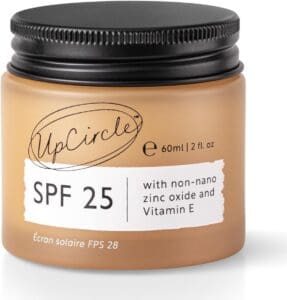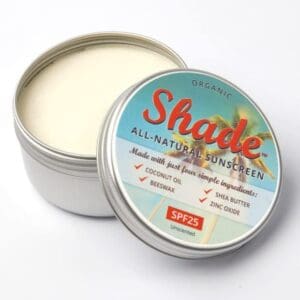In recent years, the demand for eco-friendly sunscreen has grown significantly as people become more conscious of their environmental impact. Traditional sunscreens often contain chemicals that can harm marine life and ecosystems when washed off into oceans or rivers.
Eco-friendly sunscreens aim to mitigate these concerns by using natural, reef-safe ingredients and sustainable packaging. In the UK, where environmental consciousness is high, choosing the right sunscreen involves considering both effectiveness in sun protection and environmental impact.
Table of Contents
Understanding Eco-Friendly Sunscreen
Eco-friendly sunscreens, also known as mineral or physical sunscreens, use natural mineral ingredients like zinc oxide and titanium dioxide to reflect and scatter UV rays away from the skin. These sunscreens are free from harmful chemicals like oxybenzone, octinoxate, and nano-sized particles that can be toxic to marine life and coral reefs.
When choosing an eco-friendly sunscreen, look for products that are:
- Broad-spectrum, protecting against both UVA and UVB rays
- Have an SPF of 30 or higher
- Use non-nano zinc oxide or titanium dioxide as the active ingredients
- Free from harmful chemicals like oxybenzone, octinoxate, and nano-particles
- Packaged in eco-friendly, plastic-free containers
Why Choose Eco-Friendly Sunscreen?
Eco-friendly sunscreens differ from conventional ones primarily in their formulation and packaging. They typically avoid harmful chemicals like oxybenzone and octinoxate, which have been linked to coral bleaching and are banned in several regions worldwide due to their detrimental effects on marine life. Instead, they rely on mineral-based ingredients like zinc oxide or titanium dioxide, which provide effective broad-spectrum protection without harming coral reefs or marine ecosystems.
Another crucial aspect of eco-friendly sunscreen is its packaging. Many brands use recyclable or biodegradable materials for their containers, reducing plastic waste and environmental footprint. Some even go a step further by incorporating sustainable practices into their production processes, such as using renewable energy or supporting environmental initiatives.
Top Eco-Friendly Sunscreen Brands in the UK
The UK market is seeing a growing demand for reef-safe and environmentally-friendly sunscreen options. Consumers are looking for mineral-based sunscreens that avoid controversial chemical filters like oxybenzone and octinoxate. Some of the top eco-friendly sunscreen brands in the UK include:

UPCIRCLE offers a broad-spectrum SPF 25 mineral sunscreen made in the UK. It is cruelty-free, vegan, and free of microplastics, making it a great choice for eco-conscious consumers. The sunscreen uses non-nano zinc oxide as the UV-blocking ingredient, which is considered a safer and more natural alternative to chemical filters.
The product comes in a refillable glass jar with a metal lid, reducing plastic waste. UPCIRCLE is a relatively new brand, but it has received positive reviews for its smooth application and lack of white cast, which can be a common issue with mineral sunscreens.

SHADE provides a broad-spectrum SPF 25 mineral sunscreen made in the UK. It is certified organic and contains beeswax, making it suitable for those who avoid vegan products. The sunscreen uses non-nano zinc oxide as the UV-blocking ingredient, providing a natural and effective protection.
The product comes in a metal tin packaging that can be reused or recycled, contributing to a more sustainable approach. Reviews suggest the sunscreen is thick but rubs in well, making it a good option for sensitive skin types.
SUKIN

SUKIN offers a broad-spectrum SPF 30 mineral sunscreen made in Australia. The company is carbon-neutral, cruelty-free, and vegan, appealing to environmentally-conscious consumers. The sunscreen uses non-nano zinc oxide as the UV-blocking ingredient, ensuring a natural and reef-safe formula.
While the packaging is made of plastic, Sukin’s commitment to sustainability and ethical practices sets it apart as a responsible choice for eco-friendly suncare.
ODYLIQUE

Odylique is a UK-based brand that offers a broad-spectrum SPF 30 mineral sunscreen. It is certified organic, vegan, and free from synthetic ingredients. The sunscreen uses non-nano zinc oxide as the active ingredient and comes in a recyclable aluminum tube.
Odylique is known for its commitment to sustainability and ethical sourcing of ingredients.
ORGANII

Organii provides a broad-spectrum SPF 30 mineral sunscreen made in the UK. It is certified organic, vegan, and cruelty-free. The sunscreen uses non-nano zinc oxide and is packaged in a recyclable aluminum tube. Organii focuses on creating natural and environmentally-friendly skincare products.
SUNTRIBE

Suntribe is a Swedish brand that offers a broad-spectrum SPF 30 mineral sunscreen. It is vegan, cruelty-free, and uses non-nano zinc oxide as the UV-blocking ingredient. The sunscreen comes in a recyclable aluminum tube, aligning with the brand’s commitment to sustainability. Suntribe is known for its high-quality, reef-safe formulas.
AMAZINC

Amazinc is a UK-based brand that provides a broad-spectrum SPF 30 mineral sunscreen. It is vegan, cruelty-free, and uses non-nano zinc oxide as the active ingredient. The sunscreen is packaged in a recyclable aluminum tube, reducing plastic waste. Amazinc emphasizes the use of natural and sustainable ingredients in its products.
BADGER

Badger is a US-based brand that offers a broad-spectrum SPF 30 mineral sunscreen. It is certified organic, vegan, and uses non-nano zinc oxide as the UV-blocking ingredient.
The sunscreen comes in a recyclable tin container, aligning with the brand’s eco-friendly approach. Badger is known for its commitment to using natural and sustainable ingredients.
FOX

Balmy Fox is a small business in Wales that creates a broad-spectrum SPF 25 mineral sunscreen. It is cruelty-free, vegan, and uses non-nano zinc oxide as the active ingredient. The sunscreen is packaged in a reusable metal tin, contributing to a more sustainable approach. Balmy Fox focuses on providing eco-friendly and sports-friendly suncare products.
How to Apply Eco-Friendly Sunscreen Effectively?
Applying eco-friendly sunscreen effectively is crucial for both ensuring adequate sun protection and maximizing its environmental benefits. Here’s a step-by-step guide on how to apply eco-friendly sunscreen effectively:
Apply Generously
Make sure to apply a generous, even layer of eco-friendly sunscreen to all exposed skin. This includes often-missed areas like the lips, ears, around the eyes, and the neck.
Reapply Frequently
Reapply the sunscreen every 2 hours, or more frequently if swimming or sweating. Eco-friendly sunscreens need to be reapplied just as often as traditional sunscreens.
Allow Time to Absorb
Mineral-based eco-friendly sunscreens typically require 10-15 minutes to become fully effective after application, as they need time to form a protective barrier on the skin.
Use Adequate Amount
The recommended amount of sunscreen is about 1 ounce (2 tablespoons) to cover the entire body. Make sure to apply a sufficient amount for full coverage.
Combine with Other Sun Protection
Eco-friendly sunscreen should be used in combination with other sun-safe practices, such as seeking shade, wearing protective clothing, and avoiding peak sun hours between 10 am and 4 pm.
Check the Ingredients
Look for eco-friendly sunscreens that use non-nano zinc oxide or titanium dioxide as the active ingredients, and are free from harmful chemicals like oxybenzone and octinoxate.
By applying eco-friendly sunscreen generously, frequently, and in conjunction with other sun-safe measures, you can effectively protect your skin while minimizing your impact on the environment.
Final Words
Protecting your skin from harmful UV rays is essential, but it doesn’t have to come at the expense of the environment. By choosing eco-friendly sunscreens that are reef-safe, free from harsh chemicals, and packaged sustainably, you can enjoy the sun while minimizing your impact on the planet.
With a wide range of options available in the UK, it’s easier than ever to find an eco-friendly sunscreen that suits your needs and preferences.
